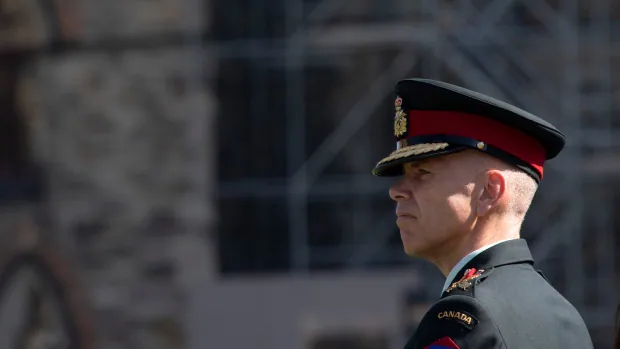It could take up to seven years for the Canadian military’s recruitment efforts to recover from the fallout of both the sexual misconduct crisis and the pandemic, says the country’s acting chief of the defence staff.

It could take up to seven years for the Canadian military’s recruitment efforts to recover from the fallout of both the sexual misconduct crisis and the pandemic, says the country’s acting chief of the defence staff.
Speaking Monday at the Kingston Conference on International Security, Gen. Wayne Eyre said he’s increasingly worried about the decline in the size of both the regular and reserve forces. He said he’s particularly alarmed at the number of experienced leaders — officers and noncommissioned officers — who are putting in their release notices and quitting the service.
The matter was discussed as late as last week at a command-level gathering. Eyre said he’s encouraging his senior leaders to stay and asking them to urge others to do the same.
“We need our mid-level leaders to dig deep and do this for the institution, to put service before self, not to retreat into retirement but to advance forward and face the challenges head-on,” Eyre said in answer to a question about leadership during the virtual forum.
While leading during good times is relatively easy, Eyre said, the military now faces the challenge of rooting out a culture of misconduct and leadership impunity.
Eyre’s remarks suggest he’s had encounters with low morale among officers — the people he said he needs to rebuild the institution in the wake of the sexual misconduct crisis.
“Many of our senior leaders are looking up and saying, ‘Yes, I don’t want to be there.’ But we need them,” he said.

Recent months have seen an almost relentless series of allegations of sexual misconduct touching the most senior ranks — including Eyre’s predecessors, Admiral Art McDonald and retired general Jonathan Vance.
Nearly a dozen leaders have been accused of either sexual impropriety or of downplaying abhorrent behaviour. That’s left many military officers and non-commissioned officers looking for the exit.
Eyre has described the brain-drain an “existential crisis” and a matter of national security.
The ‘missing middle’
Compounding the problem for the Armed Forces is the COVID-19 pandemic, which has constrained both recruiting and training.
Eyre presented the defence conference with figures on Monday that show the full-time military is 7,500 people short of its required strength — an enormous gap in a regular force of around 70,000.
“And these are the heart of our command structure, the ‘missing middle’ – master corporals, sergeants, lieutenants, captains, majors, master sailors, petty officers, lieutenant commanders,” he said. “All vital leadership roles, both in the field and as we address the existential imperative of changing our internal culture.”
Stefanie von Hlatky, associate professor of political studies at Queen’s University, said recruiting and retention were already major challenges for the Armed Forces before the pandemic and the latest episode of the misconduct crisis.
It doesn’t help, she said, that two of the leaders who were supposed to oversee policies related to growing the Armed Forces have been either removed or sidelined because of misconduct claims.
“Leadership churn in the command tasked with overseeing recruitment and retention obviously isn’t helping solve these broader personnel strains,” she said, referring to the cases of Vice-Admiral Haydn Edmundson and Lt.-Gen. Steve Whelan.
Eyre said he’s working on a recruitment plan and Von Hlatky said it seems tailored to address urgent personnel shortages.
There will still be challenges, she said.
“In convincing service members to stay rather than retire, Gen. Eyre will have to provide some compelling incentives because there is this dual challenge,” she said. “The CAF is in crisis internally and out there, the competition for talent is fierce.”

